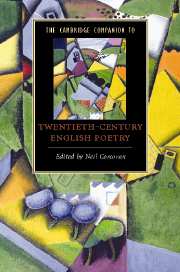Book contents
- Frontmatter
- Introduction
- Part I Contexts
- Part II Moderns
- Part III Modernists
- Part IV Later Modernities
- 10 Philip Larkin: a late modern poet
- 11 R. S. Thomas and modern Welsh poetry
- 12 Gender, feminism, poetry: Stevie Smith, Sylvia Plath, Jo Shapcott
- 13 Varieties of poetic sequence: Ted Hughes and Geoffrey Hill
- 14 Black British poetry and the translocal
- 15 Poetry and class: Tony Harrison, Peter Reading, Ken Smith, Sean O’Brien
- 16 A Scottish Renaissance: Edwin Morgan, Douglas Dunn, Liz Lochhead, Robert Crawford, Don Paterson, Kathleen Jamie
- 17 Lyric adaptations: James Fenton, Craig Raine, Christopher Reid, Simon Armitage, Carol Ann Duffy
- Index
15 - Poetry and class: Tony Harrison, Peter Reading, Ken Smith, Sean O’Brien
from Part IV - Later Modernities
Published online by Cambridge University Press: 28 January 2008
- Frontmatter
- Introduction
- Part I Contexts
- Part II Moderns
- Part III Modernists
- Part IV Later Modernities
- 10 Philip Larkin: a late modern poet
- 11 R. S. Thomas and modern Welsh poetry
- 12 Gender, feminism, poetry: Stevie Smith, Sylvia Plath, Jo Shapcott
- 13 Varieties of poetic sequence: Ted Hughes and Geoffrey Hill
- 14 Black British poetry and the translocal
- 15 Poetry and class: Tony Harrison, Peter Reading, Ken Smith, Sean O’Brien
- 16 A Scottish Renaissance: Edwin Morgan, Douglas Dunn, Liz Lochhead, Robert Crawford, Don Paterson, Kathleen Jamie
- 17 Lyric adaptations: James Fenton, Craig Raine, Christopher Reid, Simon Armitage, Carol Ann Duffy
- Index
Summary
Where better to start than with Charles Tomlinson's poem, 'Class', whose speaker confesses, 'Those midland a's / once cost me a job'? He had been employed as secretary to the author of The Craft of Fiction, a title that is 'full of class', but 'the job couldn't last' because his accent 'visibly shredded' the upper-class writer's 'fineness'. Still, the speaker reflects, 'I'd always thought him an ass / which he pronounced “arse”. There's no accounting for taste.'
Tomlinson's anecdotal poem prompts a number of reflections about poetry and class. One is that class, at least as it is manifested in poetry, is apparently inseparable from region. When I recently tried to get students to talk about class in Tony Harrison's poetry, what I actually provoked was a heated discussion of the cultural divisions between the north and south of England. Another is that it becomes visible in poetry only when a working-class point of view is being articulated. 'Middle-classness' tends to be invisible in poetry. This is what Harrison means when, addressing the bourgeoisie, he calls poetry 'your lousy leasehold' ('Them & [uz]'). A third reflection is that 'class' and the associated region are inscribed on the body of the language of poetry, and this is at least as important as overt thematic treatment. Tomlinson plays on this explicitly in his poem (when I heard him read it he pronounced 'class' with a short 'a' and 'craft' with a long 'a'). Harrison does so less explicitly in 'Book-Ends' where he rhymes 'gas' with 'pass', forcing a northern pronunciation, and most explicitly of all in 'Them & [uz]' where he distinguishes a working-class Leeds accent from Received Pronunciation by using the phonetic alphabet.
- Type
- Chapter
- Information
- The Cambridge Companion to Twentieth-Century English Poetry , pp. 215 - 229Publisher: Cambridge University PressPrint publication year: 2007
- 4
- Cited by



